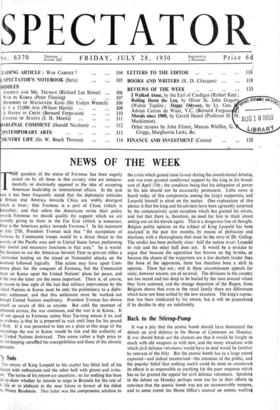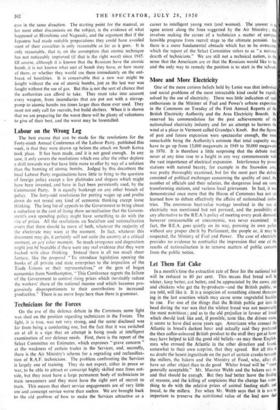Back to the Stirrup-Pump
It was a pity that the atomic bomb should have dominated tho debate on civil defence in the House of Commons on Monday. If war should break out the chances are that it would be fought as much with old weapons as with new, and the many situations with which civil defence volunteers would have to deal would be familiar to veterans of the blitz. But the atomic bomb has to a large extent captured—and indeed mesmerised—the attention of the public, and the popular belief that nothing useful could be done to counteract its effects is as responsible as anything for the poor response which has so far greeted the appeal for civil defence volunteers. Speakers in the debate on Monday perhaps went too far in their efforts tat convince that the atomic bomb was not an unanswerable weapon, and to some extent the Home Office's manual on atomic warfare errs in the same direction. The starting point for the manual, as for most other discussions on the subject, is the evidence of what happened at Hiroshima and Nagasaki, and the argument that if the Japanese had made suitable preparations they could "have avoided most of their casualties is only reasonable as far as it goes. It is only reasonable, that is, on the assumption that atomic technique has not noticeably improved (if that is the right word) since 1945. Of course, although it is known that the Russians have the atomic bomb, it is not known what sort of bomb they have, or how many of them, or whether they would use them immediately on the out- break of hostilities. It is conceivable that a new war might be fought without the use of atomic bombs, just as the last war was fought without the use of gas. But this is not the sort of chance that the authorities can afford to take. They must take into account every weapon, from incendiaries that are put out with a stirrup- pump to atomic bombs ten times larger than those ever used. They must not only call for recruits, but build shelters. When it is shown that we are preparing for the worst there will be plenty of volunteers to give of their best, and the worst may be forestalled.



































